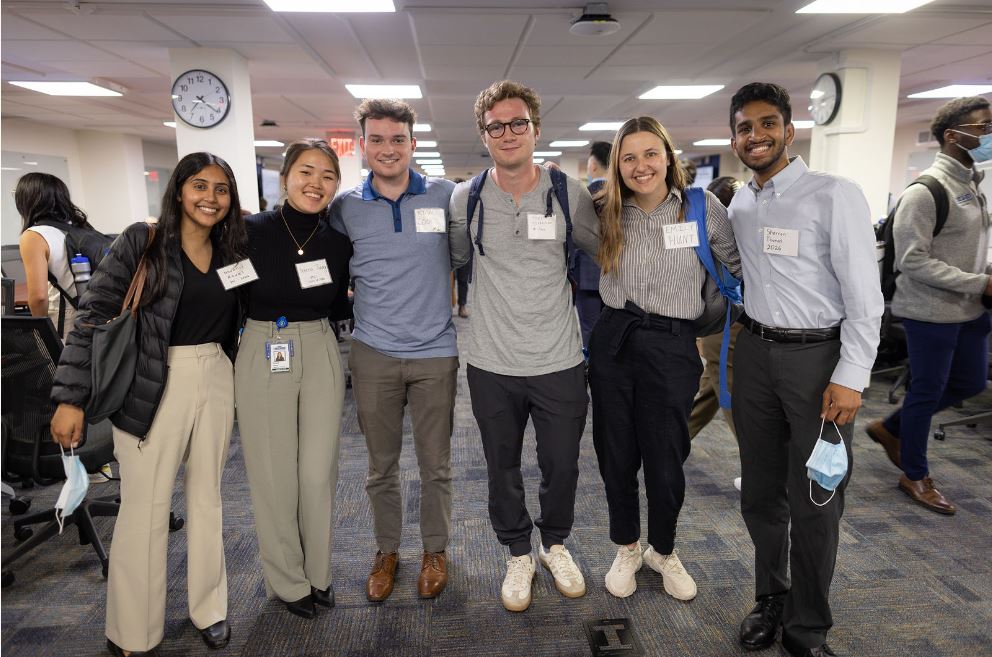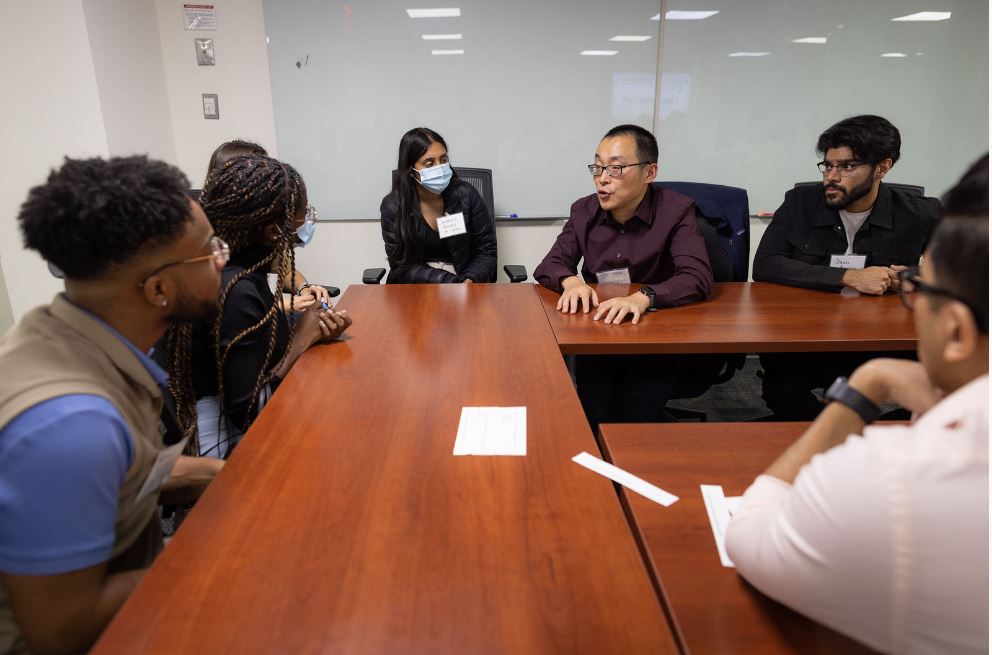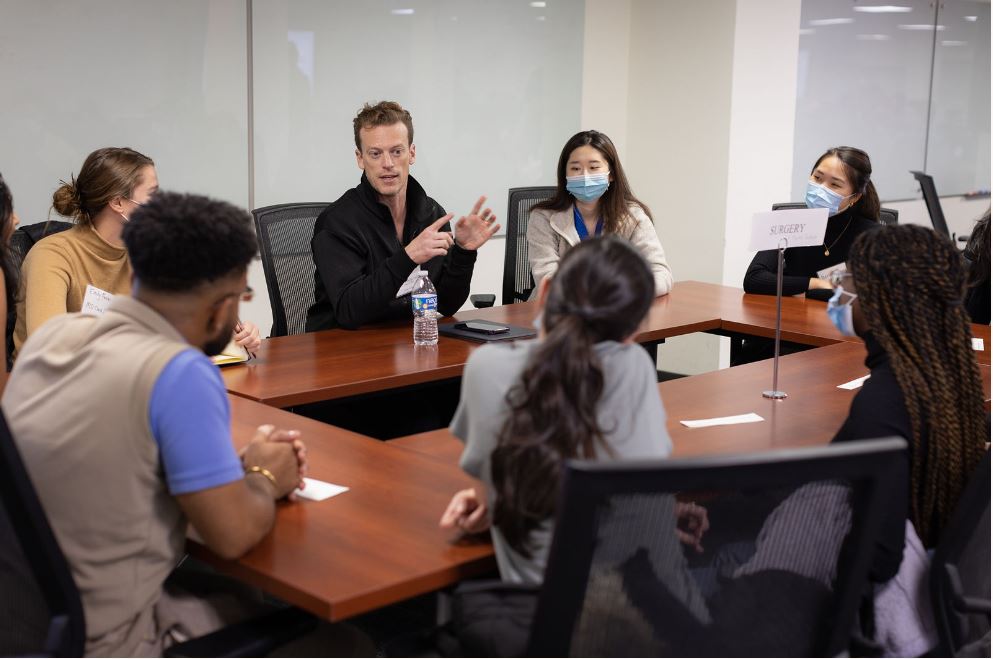Bringing Mentors to the Table: Einstein’s alumni turn out in force to help students ponder their specialties
When Assumpta Madu (M.D. '93), then Clinical Associate Professor and Vice Chair of Education at NYU Langone, Ophthalmology, received a call from a former Einstein faculty member, asking if she’d consider taking over his practice in Tampa, her first reaction was to turn up her nose.

“I’d spent my career in academic medicine – I thought, ‘No, I’m here to teach residents and take care of a community with no insurance,’ which is something that was really instilled in me at Einstein,” Madu told students one evening this past November at Einstein’s Career Speed Networking event. “But I wanted to move to Florida. And it turned out to be fabulous. The thrill for me is helping people, helping the community. I still frequently cancel bills and operate on people at no charge, and it feels good.” Madu, who serves as a Co-chair of the Awards & Nominations Committee on Einstein’s Alumni Association Board of Governors, has since moved to the Bronx, where she runs a private practice called Bartow Ophthalmology. “So, keep an open mind, because you just never know where you will end up.”
That, in a nutshell, was the key takeaway from an event at Einstein – that looked a lot like speed dating – at which some 100 medical and MSTP students were given the opportunity to meet with faculty and alumni in nearly 30 different specialties and subspecialties.
“There’s space for all of you, with your talents and passions, to make an impact in the world of health and medicine,” Sheera Minkowitz, M.D. ‘12, Co-Chair of the Student Mentoring Committee of the Board of Governors, said in her opening remarks in Robbins Auditorium. “It’s OK if you don’t know yet what you want to do,” added Minkowitz, Assistant Professor of Pediatric Hematology/Oncology at NewYork-Presbyterian Hospital, before students fanned out to tables throughout the first and second floors of the Forchheimer Building for 15-minute Q and A sessions. “It’s a process – the key is to understand yourself and explore your options, and tonight is an informal way to meet people and be inspired by their journeys.”
For some students, like Olivia Allen (‘25), the subsequent conversations did indeed offer some “Aha” moments.
“I only became interested in ophthalmology in the past month,” Allen told Madu. “I visited Dr. Gibraltar’s lab [on campus], and I’d never seen anything so cool before.”
Madu smiled. “The day I chose ophthalmology, it was because I looked at the iris – it was the most beautiful thing.”
“Yes – the iris!” Allen exclaimed, and soon she was nodding earnestly as Madu offered advice ranging from the practical: “Let people in the department see that you’re interested” to the more spiritual: “pretend you’re the attending seeing that patient – does it feel right?”.
At the table for emergency medicine, manned by a trio of alums, including two Einstein faculty: Associate Professor Michael Jones (M.D. ‘07), the department’s Vice Chair of Education, Assistant Professor Josh Silverberg (M.D. ‘09), Acting Internship Director of Undergraduate Education, and Neal Shipley (M.D. ‘87), Medical Director at Northwell-GoHealth Urgent Care, students were in more of a show me mode. Jones, who needs to fill 20 residency positions for the coming year, had offered a particularly impressive list of selling points – cases that range from bus crashes to tiger attacks (someone who climbed into a zoo enclosure to check out the cubs); job opportunities that include parachuting in to help soldiers in active combat; and, not least, Einstein’s own history as the nation’s first paramedic training program, where faculty members first showed that EMTs in ambulances could successfully use defibrillators.

“Okay, but what don’t you like?” asked someone in a large group of students.
The answers were forthright. Jones cited the lack of long-term relationships with patients – “you don’t get to see someone through their life stages, and if you do, it’s because we’re failing them – they’re struggling, and they keep coming back to the ER.” Silverberg and Shipley pointed to the broader failings of the U.S. medical system.
“I get frustrated when I see someone who should be in a primary care doctor’s office, but called six physicians and couldn’t get an appointment for six months,” Silverberg said. “The cracks in the system point toward us.”
“I echo that,” Shipley said. “Inconsistencies show up in the ER, and our job is not to let people die. It’s a bit of a crusade. But you can go home from work and know how many lives you saved on a single shift.” Or, he acknowledged, that there were lives you couldn’t save. “It’s not easy to pronounce someone dead or tell their family. And sometimes it’s someone you know.”
Other specialties offered a greater sense of control. At the cardiology table, William Gotsis (M.D. ‘90), a managing partner at Crystal Run Health Care, told students that what he liked about his field was that “it had a lot of guidelines-directed medical therapy – there was technology, there was good data, and the problems were correctible with medicines and procedures.
“My last year in medical school, stents were introduced – fixing structural heart disease without surgery – and I thought, this is going to work for me.”
He was the first cardiologist at Crystal Run, joining when there were only six doctors. Today there are 450. “I love being part of a team,” he said, “It makes you smarter.”

And at the anesthesiology table, Dominique Jean (M.D. ‘05), a Bronx-based independent practitioner who maintains a separate career as a wardrobe and personal stylist, talked about the freedom the field has given her.
“The hours are long, but the pay is good, and I’ve been able to choose my own life and have my weekends off,” she told students Kevin Liu Kot (‘24), Jordan Giordano (‘26), and Emily Hunt (‘26). “And you can separate from the job emotionally because you don’t have patients calling you.”
That’s not to say anesthesiology isn’t demanding or deeply rewarding. “You have to know about everything, and I like that, because I’m a know-it-all,” Jean said. “And while patients may talk to you for only five or ten minutes before a procedure, it’s the most significant five or ten minutes they’re going to spend with anyone.”
We’re extremely grateful to all of our alumni who participated, including several representatives from the Board of Governors who made this such a meaningful experience for our students. This is just one of the ways alumni can get involved. To learn more, please reach out to Alumni Relations at einsteinalumni@einsteinmed.edu or 718-430-2013.
A Talk with Noreen Kerrigan
![Noreen Kerrigan, M.P.A Associate Dean of Admissions]() Noreen Kerrigan, M.P.A
Noreen Kerrigan, M.P.A
Associate Dean of Admissions
Penny M. Stern, M.D. '89, MPH a member of the Alumni Association Board of Governors interviewed Noreen Kerrigan, Associate Dean of Admissions recently. Here is the full interview.
How did you come to be involved in Admissions for Einstein?
"I've been here since 1977 when I started at Jacobi with Dr. Shelley Jacobson. I was one of the people who headed up his Institute for Emergency Medicine at Jacobi where we trained the paramedics for New York City. And the medical students were rotating through the emergency room and I got to know them and very quickly, I came 'across the street'. As Admissions Officer – I think that was my first title – I think my first responsibilities were just cleaning up the mail when I walked into the office because everything in those days was paper. The first chairs of the admissions committee were Dr. Melvin Zalefsky and the beloved Dr. Albert Kuperman. These were the two people responsible for me being here and, I think, Shelley Jacobson.'
Any memorable admission stories?
"Jonathan [Salk] did not graduate from Einstein, as he had moved to California in his last year. but he loved Einstein so much that he returned to march with his class at graduation."
Noreen spoke about admitting students like Scott Powell, M.D. '87 (formerly a lead singer of the 1970s doo-wop group, Sha Na Na who entered Einstein after completing a post-bac and went on to become a successful orthopedic surgeon) and Jonathan Salk, M.D. (son of Jonas Salk, M.D., the polio vaccine pioneer): 'Jonathan actually did not graduate from Einstein as he had moved to California in his last year to be with his wife, who was there. But he loved Einstein so much that he returned to march with his class at graduation.' She noted that 'our Dean, Gordon Tomaselli, has said that 'we walked through this door together' because he began medical school at roughly the same time I began in Admissions.'
What is it like to see alumni children coming to Einstein and how are alumni involved?
![Penny M. Stern, M.D. MPH Member, Alumni Association Board of Governors, Chair]() Penny M. Stern, M.D. ’89 MPH
Penny M. Stern, M.D. ’89 MPH
Member, Alumni Association
Board of Governors, Chair
'We have started seeing three generations of Einstein graduates in the same families. We understand the importance of legacy and I am always willing to talk with students who are the children or grandchildren of alums.” Noreen also mentioned the importance of having alumni involved in speaking with applicants to the school, 'especially in these Zoom times when applicants can’t visit the school.”
“The presence of the Admissions Office in students’ lives does not end with their acceptance to Einstein. We’re not grading them or rating them anymore and they come back to us for connection and support. We have a coffee pot, snacks right out there, we also have our love. Usually – when we’re in residence – we have a puzzle that’s out on the desk and we have students who come back to hang out and to chat. And, we want them to talk to the applicants that may be sitting outside.
"The presence of the Admissions Office in students lives does not end with their acceptance to Einstein."
What can you tell us about the Admissions Committee and the Admissions Office Staff?
“The Admissions Committee is comprised of such wonderful people. Compassionate, kind, all the qualities we want in our physicians. And my own team, the women who work with me – are three of the most wonderful people. With rare exceptions, everyone has retired from the Admissions Office – they haven’t left to go somewhere else! Somehow, that homey feeling still exists and it permeates the atmosphere at Einstein.“
Given the longevity of your service in admissions, are there any characteristics of Einstein students and alumni which make them stand out/special?
"I've heard from our own students and faculty, 'This is an Einstein student' but it’s hard to define it. We know it when we see it but how we classify that, I don't know. Maybe that person who talks about the unique population of the Bronx, the person who wears their heart on their sleeve. They really want to change the world. I heard from a residency director at a peer institution, an old friend of mine –He called me one day and said, "I just interviewed one of your students for residency and there's nothing like an Einstein student. I'll take them over any other students any day.’ The training is not to be beat in terms of what the students are getting clinically.”
"I just interviewed one of your students for residency and there’s nothing like an Einstein student. I'll take them over any other students any day."
Tell us about the new class of 2025.
“How do we get through nearly 10,000 applications? We’re not looking just for ‘brains on stilts’. We were one of the first schools to go with compentency-based admissions back in 2014. We talked about the importance of demonstrating a history of clinical experience and maturity and communication skills and cultural competency.”
![]()
What do you do in your spare time?
“I don’t have that much spare time. I would say I get up at 5’oclock and start working. If I can get out the door at 5am or 6am to go running, that’s terrific. I consider that a great thing. I’m building a house with my partner, Tom, in Saratoga. I designed it and he is actually building it so that’s my hobby when I do have a spare moment. I saw this house in my head and got a friend who’s an architect to put it on paper. We’ve been building it for five years and hope to have it done by early next year.”
As our conversation came to an end, Noreen shared a few more thoughts on her experience at the medical school: “I have learned so much at Einstein. The spirit, the way of Einstein, the people I have had the pleasure and the honor of working with, everyone’s a teacher to me. I am so blessed to have this job. I look at the applications from students who are so smart and so accomplished in every way, shape and form. They are an amazing group of human beings and I thank the Lord that we have so many people who want to do this for a living.”